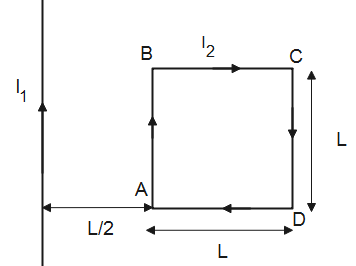Question
Question: A square loop ABCD, carrying current \({{I}_{2}}\), is placed near and coplanar with a long straight...
A square loop ABCD, carrying current I2, is placed near and coplanar with a long straight conductor XY carrying a current I1, as shown in figure. The net force on the loop will be
(A).2πμ0I1I2
(B). 2πμ0I1I2L
(C). 3π2μ0I1I2
(D). 3πμ0I1I2

Solution
The wire and the loop both have current flowing through them and hence a magnetic field is developed due to both. The force acting between both elements depends on the currents in the wire and loops, distance between wire and loop and the length of the loop. According to the direction of force, the resultant will be the vector sum of all forces acting on the sides of the loop.
Formulas used:
F=2πrμ0I1I2×l
Complete step-by-step solution:
The force between two straight wires is given by-
F=2πrμ0I1I2×l - (1)
Here, F is the force acting between the wires
μ0 is the permeability of free space
I1 is the current in one wire
I2 is the current flowing through the second wire
l is the length of the element on which the force acts
r is the distance between the wires
The force acting on AD and BC is equal and opposite and hence will cancel out each other.
The force acting on AB will be, from eq (1),
F1=2π2Lμ0I1I2L⇒F1=2π2μ0I1I2
The force acting on DC will be, from eq (1),
F2=2π(L+2L)μ0I1I2L⇒F2=2π(3)2μ0I1I2
Using the right hand thumb rule which states that if the thumb represent the current in a straight wire, then the fingers represent the direction of magnetic field, the direction of force on AB and DC is different, therefore, the total force on the loop due to the straight wire is-
F=F1−F2
We substitute values in the above equation to get,
F=2π2μ0I1I2−2π(3)2μ0I1I2⇒F=3π2μ0I1I2
Therefore, the total force acting on the loop is 3π2μ0I1I2. Hence, the correct option is (C).
Note: Since the current in the loop is flowing in the clockwise direction, a south pole is formed. While the magnetic field due to the current in the wire is in the plane of the paper for the loop, hence a north pole is formed. Therefore, a resultant attractive force exists between the wire and loop.
